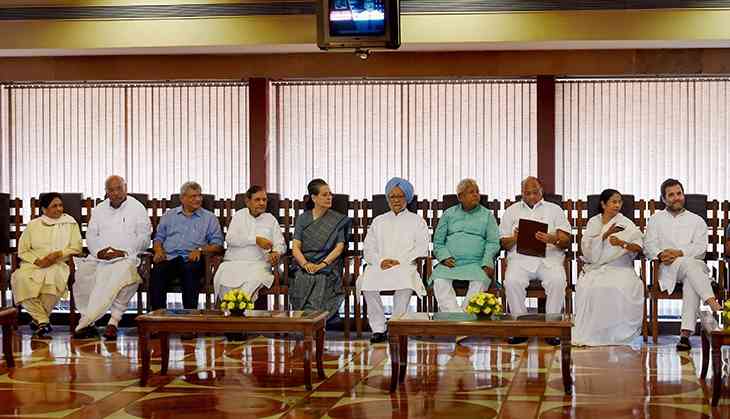At Sonia lunch, Oppn hints it wants a 'Kalam' as Prez. Will Modi yield?

The luncheon meeting hosted by Congress president Sonia Gandhi with leaders of other Opposition parties ended with a consensus that if the candidate nominated by the ruling party isn't acceptable to them, they will field a candidate of their own.
During the course of the meeting, it was also decided that if there is no consensus amongst the Opposition parties, a small committee would be formed to decide on the name of the candidate.
Big shots come together
The Congress president had taken the initiative to invite Opposition parties for a meeting at Parliament House to discuss several issues, including the elections for the post of President and Vice-President, which fall vacant in July and August respectively.
The Congress, under the leadership of Sonia Gandhi, is trying to lay the foundations for a grand alliance that could set the agenda for the 2019 Lok Sabha elections.
With the intent to promote Opposition unity, the Congress president convened a 17-party meeting, which was attended by the top leadership of various regional and national parties. Those present included Lalu Prasad Yadav (Rashtriya Janata Dal), Mayawati (Bahujan Samaj Party), Mamata Banerjee (Trinamool Congress), Sharad Pawar (Nationalist Congress Party), Sharad Yadav and KC Tyagi (Janata Dal United), Akhilesh Yadav (Samajwadi Party), Kanimozhi (Dravida Munetra Kazhagam), S Sudhakar Reddy and D Raja (Communist Party of India), Omar Abdullah (National Conference), and CPI(M) general secretary Sitaram Yechury, among various others.
From the Congress, former Prime Minister Manmohan Singh, party vice-president Rahul Gandhi, Ahmed Patel, Ghulam Nabi Azad and Mallikarjun Kharge were also present during the meeting.
Deviating from Vajpayee's path
Soon after the meeting got over, West Bengal Chief Minister Banerjee spoke to the media and said the name of a candidate was not discussed.
She further added that the Opposition would accept the government's candidate, on the condition that he/she would be 'secular' and uphold the Constitution.
Banerjee, who is on a two-day visit to Delhi, underlined that the decision of the meeting was to wait for the ruling dispensation to announce its candidate. “If it satisfies all of us, then we can take a look at it,” she added.
Referring to the 2002 Presidential elections, Banerjee said that the then-Prime Minister, Atal Bihari Vajpayee, had pushed Dr APJ Abdul Kalam's name, and tried to reach a consensus with parties across the political spectrum.
Blaming the current NDA government for deviating from the practice of consulting other parties for such crucial posts, Opposition parties said they would field their own candidate in the absence of any outreach for a consensus candidate.
“Elections for the post of President and Vice-President of India are forthcoming. The normal practice has been that the ruling party takes the initiative to build a consensus on the name of candidates for these important offices. This has not happened so far. If acceptable consensual candidates do not emerge, then we (Opposition parties) shall decide to field such person who shall steadfastly defend the Constitutional values of our Republic,” read the parties' statement.
Beyond Prez polls
In addition, Opposition parties expressed their resolve to strengthen floor coordination in Parliament, to unitedly oppose the incumbent government's policies, which are imposing 'unprecedented burden' on all sections of society, particularly the weaker sections.
The parties also expressed concern over the situation in Jammu and Kashmir, and were united in criticising the government over its failures, particularly the ongoing violence in Saharanpur, and demonetisation.
The most significant part of this meeting was that the Congress president was successful in getting bitter rivals like Uttar Pradesh's SP and BSP, and West Bengal's Left and Trinamool on a common platform, which is no easy feat.
However, it is also the result of the current political scenario in the country, wherein the BJP has been on a roll, winning one state after another with overwhelming majorities.
It is for this reason that these parties have put their differences on the backburner to present a united face to counter the existential threat they face from the growing popularity of Prime Minister Narendra Modi.
This isn't the first time that efforts to create a united Opposition are being tested. Such attempts have been made earlier, but failed miserably because of the egos of various regional satraps.
It remains to be seen whether this unity would survive the test of time, and present any challenge to Modi, who seems all set to reclaim the Prime Minister's post in 2019.
However, the elections of the President and Vice-President could be historic for the BJP, as it is for the first time that it would be able to elect two of its own to these crucial posts.
First published: 26 May 2017, 21:53 IST
